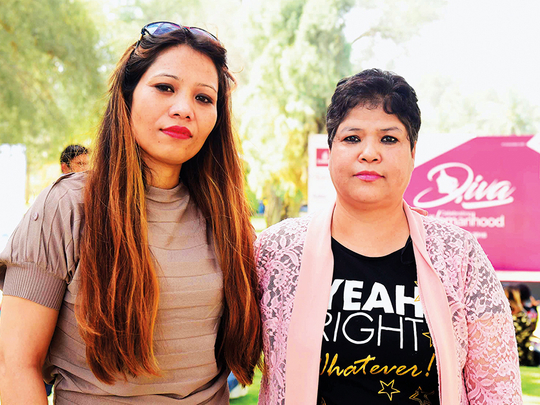
Dubai: Is happiness directly proportional to the money you have? How much does it take for someone to be genuinely and truly happy? Can you survive on a Dh200 allowance? Sounds impossible but many women of the blue-collar workforce are actually doing that. They remit nearly 90 per cent of their salary home for the upkeep of their children and elders and limit their needs to the bare basics while their employers provide them with accommodation and transport.
Despite their frugal lives and shoestring budgets, these women are content and glowing, happy in the knowledge that their sacrifice is helping their families lead better lives and their children build a future.
Social workers point out that most blue-collar women workers from the Indian subcontinent and Africa come from very poor backgrounds where they do not have the chance to get higher education. They come to the UAE as cleaners, conductors, office support staff and salon workers. Many of them are either widows, divorced or have the added burden of supporting extended families.
“While men we find at labour accommodation often spend money on beverages, food and cinema, women don’t mind living frugally to be able to spread a little more goodness back home and we find they do it with a smile,” said a social worker from Smart Life who often visits labour accommodation for women and has worked closely with them.
While the majority of residents might shake their heads in disbelief, Gulf News spoke with five blue-collar workers who were recently treated to a weekend outing of fun and games by Aster Volunteers, a charity organisation. Most of them said they were grateful to be in the UAE which had given them the opportunity to provide for their families. Living on small budgets and frugal meals was not a feat for many of them who came from families that had one meal a day and they came forward to narrate just how they managed life for just Dh200 per month.
‘I think of the happy faces of my mum and kids’
Although it is a tough act, there is no trace of sadness on her face and Nannungi jumped up to do the Zumba and stretching for yoga, eager to make most of the day. “I haven’t gone for an outing other than a church service for the last six months and am enjoying this time with my compatriots,” she said.
She pointed out that although it was challenging to survive on such a thin allowance, it was not impossible. She said: “It is difficult but this is something I have to do, so I keep myself on a tight budget.” Giving a break-up of how she manages herself on that amount, she says: “I buy 5kg of rice that lasts me for three months as I dislike rice and eat very little during each meal time. So that costs me about Dh30 for a bag, which means Dh10 per month. The chicken, spices and the cooking oil cost me Dh20 per week, about Dh70-90 per month. I make rice and chicken curry for the entire week and eat that for lunch and dinner. It is boring but that is the only way I can save expenses,” said Nanungi.
Being resourceful, she looks out for some treats or times when some visiting friends from Uganda bring her Kwon, the corn meal porridge that is her staple food at home. “I love Kwon and when someone comes from home, they get us a bag of it. That lasts me for special treats through the year. Occasionally when some charity organisations distribute free rice, it helps me save on the rice money which I am able to spend on vegetables and a few goodies,” added Nannungi.
Nannungi lives in a shared accommodation provided by her office that also provides transport to and from her place of work. She spends additionally Dh50 on a month’s transport, which is basically going to the church once a week in the bus. “The WiFi connection costs me Dh25 and as we can no longer make video calls which are too expensive for us, I make do with listening to my son’s or niece’s voice on the audio chat. We exchange photographs and I also buy a local phone card for about Dh30 per month. What is left of the Dh200 is spent on buying toiletries. That is about all.”
She is tempted to buy hair clips and accessories and eat out but refrains herself. “Occasionally, once in three months, I do keep an extra Dh100 for myself in case I want to indulge a little with my friends. There are times when we lend money to each other and have loans to pay back. But I try and stick to the Dh200 a month budget. I think of the happy faces of my mum and the kids and feel greatly satisfied that they are well looked after and well fed and feel it’s worth the trouble of cutting on my personal expenses,” Nanungi says thoughtfully.
‘We make one call per fortnight home’
“I am not married,” says Tandukar who is 44, “but I support my sister who has a son and daughter. I want them to have a sound education and a happy life so that they can one day grow to be rich and educated enough to have better jobs.”
Tandukar and Giri share their food expenses, surviving mainly on a lentil curry and rice that they cook for the entire week. Giri who is in charge of the photocopy machine at the school is unmarried as well, but supports her entire family. The women, who share the accommodation, pool in their resources.
“Sharda and I share the food money so we spend about Dh50 each on rice and lentils for the month. We allocate some money for some vegetables. The other Dh100 is spent on WiFi, phone card and toiletries,” said Giri.
“It is impossible to afford the app that can give us access to Skype so we are happy to hear the voices of our loved ones on WhatsApp which is supported by the WiFi connection. Both of us make one call per fortnight home,” she says wistfully.
Occasionally, the two give themselves a treat and set aside an additional Dh50 for an outing. “We go by bus, have some street food, shop for something small and that keeps us cheerful,” said Tandukar.
Tandukar is also completing an education module provided free by the charity, Smart Life, which works with blue-collar women workers. “I completed my first level of education in etiquettes and conversation and have graduated to Senior II,” she said with pride.
‘I share my joy with friends when I feel generous’
Correa is a little indulgent occasionally and spends on eating and outing once in three months. “I do share my joy with other friends when I feel generous. I keep the extra Dh100 for these special occasions or in times when I am feeling sick as despite health insurance we have to pay some amount to the doctor.”
‘I save all money as I have to support three groups of people’
Almost every woman living in shared accommodation has an identical story no matter which country she belongs to. Sajitha Bahuleyan, 37, a mother of two adolescent children, said her husband who had been in the UAE till recently lost his job and had to return to India. “Ever since my husband lost his job, I have been the sole breadwinner for the family. My children are studying in Pune, India, and live with my sister. I have to support her family and my kids and also send some money to my aged mother-in-law in Kerala. She is nearly 75, cannot support my children but I have to look after her,” said Bahuleyan.
She sends Dh700 every month on average to the family as she remits Dh300 per month for household expenses to her sister in Pune and Dh1,200 every quarter to pay school fees of her two children. “In addition I send the rest of the money to my husband and mother-in-law and set aside Dh200 for myself.”
Like other women, Bahuleyan survives on rice and curry that she cooks for the entire week as school starts early and she finds it economical and less tiring to cook just once a week. “We have a refrigerator and microwave oven at our accommodation and it is much easier to cook and store in boxes in the fridge and come back and heat a portion of the food and eat.”
Like other women, Bahuleyan subscribes to the Dh25 WiFi service and buys a phone card for Dh30 to make calls. “I feel happy to hear the voices of my children. Earlier when my husband had a job, it was easier to have a few indulgences; I could go out with him and we would eat out. But now I save all my money as I have to support three groups of people and I cannot afford to waste a single fil. That is why an outing arranged by any volunteer organisation is so special for us. We get to laugh, dance, do free yoga, have nice food and also get goody bags from the sponsors.”
The women have truly mastered the art of stretching the dirham to every fil.








